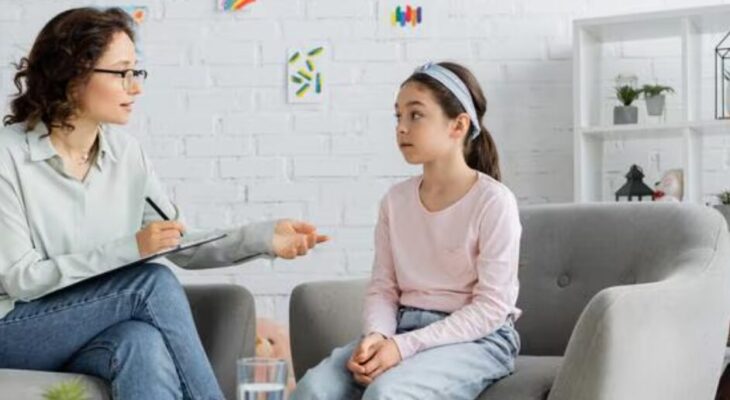Have you ever thought about how children deal with difficult experiences or behaviour struggles?
Many times, young minds carry feelings they cannot explain, and parents may feel unsure of how to guide them. Therapy gives children a safe place where they can share feelings, learn healthy habits, and slowly build confidence. It is like giving them the right tools at the right time so they can grow stronger both emotionally and socially.
Why Therapy Matters for Children
Therapy is not only about solving problems. It is about giving children the right support to understand themselves better and learn ways to handle emotions.
When children go through difficult situations or show behavioural changes, therapy provides them with healthy ways to express their thoughts. It helps them learn skills that make school, friendships, and family life more positive.
Therapies such as child trauma therapy are like a safe corner where children can talk openly. It gives them new ways to express feelings through words, play, art, or stories. Parents also get guidance on how to support their child at home. This teamwork between children, parents, and therapists helps children grow in a balanced way.
Helping Children Express Emotions
One of the first things therapy does is help children put feelings into words. Many children may feel upset, restless, or worried, but may not know how to explain.
Through therapy sessions, they learn to identify feelings and share them in a simple way. This makes emotions less confusing and helps them build better communication with parents, teachers, and friends.
Building Positive Behaviour
Therapy also supports children who face behaviour challenges. With gentle steps, children learn the importance of routines, listening, and respecting others.
They practice positive behaviour in small ways, and over time, these habits become part of their daily life. Parents notice small but meaningful changes, like improved focus, better friendships, and calmer behaviour at home.
Strengthening Confidence and Self-Esteem
Therapy is not only about emotions and behaviour. It also builds self-confidence. Children begin to feel good about themselves when they see progress. For example, a child who once felt shy to speak may start sharing stories in class or joining group play.
These small wins help children see their strengths, which makes them feel proud and motivated to keep growing, and this progress is often supported through counselling for child behaviour that guides them in positive ways.
Types of Therapy That Support Children
There are different forms of therapy, and each is helpful in its own way. Therapists use methods that suit the child’s age, comfort level, and needs. Every child is unique, so therapy is often tailored to what works best for them.
Therapy for children is not only done by talking. Sometimes, play, art, or storytelling works even better. These creative activities help children express feelings without pressure. Parents also become part of the process, which makes the progress stronger.
Play Therapy
Play therapy uses games, toys, or role play to help children open up. A child may act out a situation with dolls or draw pictures that show how they feel. This is often easier for children than sitting and talking. It helps them feel safe while sharing.
Art Therapy
Art therapy allows children to express their thoughts through colours, shapes, or drawings. Painting or making simple crafts can help children release feelings. It also makes therapy enjoyable, and children often look forward to these sessions.
Talk and Behaviour Therapy
Older children may feel comfortable with simple talk therapy, where they share thoughts openly. Behaviour therapy focuses on building positive habits and gently reducing habits that may hold them back. This type of therapy gives children skills they can use every day, like problem-solving or handling stress in school.
Role of Parents in the Therapy Process
Therapy becomes more helpful when parents are also involved. Parents can support children by listening to them, following routines suggested by therapists, and encouraging healthy habits at home. A child feels safe when parents are calm and supportive.
Parents also learn from therapy. They understand how to respond when a child feels upset or restless. Instead of reacting with worry, parents begin to use simple methods that create trust and comfort. This teamwork between child, parent, and therapist helps children feel supported both inside and outside the therapy room.
Creating a Safe Home Environment
Therapy encourages parents to create spaces where children feel secure. This may include regular family time, simple bedtime talks, or playing together. When children feel understood at home, therapy progress becomes stronger.
Practicing New Skills at Home
Children learn new ways to manage emotions in therapy, but they need practice at home. Parents play a role in reminding children of these skills. For example, if a child learns to use words when upset, parents can gently guide them to use this method during family interactions.
Encouraging Healthy Routines
Parents can also help by keeping daily routines simple and balanced. Regular sleep, healthy meals, and study time mixed with play time all support the growth of children. Therapy often reminds families of the importance of balance in daily life.
How Therapy Helps with Learning and School Life
Therapy not only supports emotional health but also helps children in school. When children feel more confident and calm, they are better able to focus in class. They start building friendships more easily and enjoy learning without pressure.
Therapists often work with educational experts to support children in their studies. This could include helping with focus, memory, or managing classroom stress. The aim is always to make learning fun and less overwhelming for the child.
Improving Focus and Attention
Therapy teaches children small steps to improve focus, such as breaking tasks into smaller parts or using relaxation techniques before study. These skills slowly increase their attention span.
Building Positive School Relationships
Children also learn how to connect with classmates in a friendly way. When they practice kindness, sharing, and listening, friendships grow stronger. This makes school feel like a happy place rather than a stressful one.
Supporting Learning Styles
Educational psychologists sometimes join the process to understand a child’s learning style. Some children learn better through visuals, others through listening or practice. Identifying this helps teachers and parents guide the child better.
Why Therapy Brings Long-Term Growth
Therapy is not a short-term effort. It plants strong roots for long-term growth. Children who attend therapy often continue to use skills they learn throughout their lives. They carry forward confidence, healthy habits, and strong communication skills as they grow older.
Parents also benefit by learning better ways to connect with their child. Families feel closer, communication becomes easier, and children grow in a positive direction.
Building Lifelong Emotional Skills
When children understand emotions at a young age, they are better prepared for future challenges. They know how to stay calm, share feelings, and solve problems without fear. These are skills that last a lifetime.
Stronger Family Bonds
Therapy brings families together by improving communication. Parents and children share more openly, and trust grows stronger. This bond supports children at every stage of their growth.
Confidence for the Future
Children who experience therapy often step into the future with confidence. They know how to handle new situations, make friends, and try new activities. Therapy gives them a strong foundation to build a happy and healthy life.
Conclusion
Therapy helps children in many positive ways. It gives them safe spaces to express feelings, supports them in building healthy behaviour, and improves their confidence. Parents also play an important role in the process, learning how to guide children with patience and care.
By supporting both children and families, therapy builds stronger roots for a happy future. It is like giving children the right tools to grow into confident, kind, and balanced individuals.





